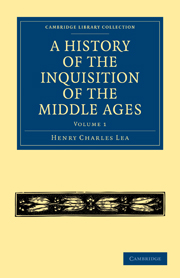Book contents
- Frontmatter
- PREFACE
- Contents
- BOOK I—ORIGIN AND ORGANIZATION OF THE INQUISITION
- CHAPTER I THE CHURCH
- CHAPTER II HERESY
- CHAPTER III THE CATHARI
- CHAPTER IV THE ALBIGENSIAN CRUSADES
- CHAPTER V PERSECUTION
- CHAPTER VI THE MENDICANT ORDERS
- CHAPTER VII THE INQUISITION FOUNDED
- CHAPTER VIII ORGANIZATION
- CHAPTER IX THE INQUISITORIAL PROCESS
- CHAPTER X EVIDENCE
- CHAPTER XI THE DEFENCE
- CHAPTER XII THE SENTENCE
- CHAPTER XIII CONFISCATION
- CHAPTER XIV THE STAKE
- APPENDIX
CHAPTER XIII - CONFISCATION
Published online by Cambridge University Press: 29 August 2010
- Frontmatter
- PREFACE
- Contents
- BOOK I—ORIGIN AND ORGANIZATION OF THE INQUISITION
- CHAPTER I THE CHURCH
- CHAPTER II HERESY
- CHAPTER III THE CATHARI
- CHAPTER IV THE ALBIGENSIAN CRUSADES
- CHAPTER V PERSECUTION
- CHAPTER VI THE MENDICANT ORDERS
- CHAPTER VII THE INQUISITION FOUNDED
- CHAPTER VIII ORGANIZATION
- CHAPTER IX THE INQUISITORIAL PROCESS
- CHAPTER X EVIDENCE
- CHAPTER XI THE DEFENCE
- CHAPTER XII THE SENTENCE
- CHAPTER XIII CONFISCATION
- CHAPTER XIV THE STAKE
- APPENDIX
Summary
Although, for the most part, as we shall see, confiscation was technically not the work of the Inquisition, the distinction was rather nominal than real. Even in times and places in which the inquisitor did not pronounce the sentence of confiscation, it was the accompaniment of the sentence which he did pronounce. It was, therefore, one of the most serious of the penalties at his disposal, and the largeness of the results effected by it give it an importance worthy a somewhat minute examination.
For the source of this, as of so much else, we must look to the Roman law. It is true that, cruel as were the imperial edicts against heresy, they did not go to the length of thus indirectly punishing the innocent. Even when the detested Manichæans were mercilessly condemned to death, their property was confiscated only when their heirs were likewise heretics. If the children were orthodox they succeeded to the estate of the heretic parent, who could not execute a will and disinherit them. It was otherwise with crime. Any conviction involving deportation or the mines carried with it confiscation, though the wife could reclaim her dower and any gifts made to her before the commission of the offence, and so could children emancipated from the patria potestas. All else inured to the fisc. In majestas, or treason, the offender was liable to condemnation after death, involving the confiscation of his estate, which was held to have lapsed to the fisc at the time when he first conceived the crime.
- Type
- Chapter
- Information
- A History of the Inquisition of the Middle Ages , pp. 501 - 533Publisher: Cambridge University PressPrint publication year: 2010First published in: 1888



